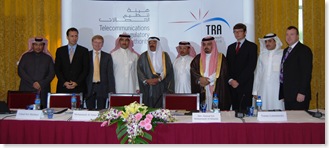Etisalat revealed today it will offer Apple’s iconic 3G iPhone to consumers in the UAE and Saudi Arabia later this month, making it the first of the Gulf markets in which the device is officially available.
 The UAE operator did not offer further details about the agreement with Apple, except to say that the iPhone would be offered in Saudi Arabia through second mobile operator Mobily; in which Etisalat is a 26.25 per cent shareholder.
The UAE operator did not offer further details about the agreement with Apple, except to say that the iPhone would be offered in Saudi Arabia through second mobile operator Mobily; in which Etisalat is a 26.25 per cent shareholder.
At the moment the closest markets where consumers can officially purchase the device is in Jordan through Orange, and in Egypt and Turkey through Vodafone, which has an agreement to offer the iPhones in ten of the countries where it operates. It had been anticipated that Vodafone’s imminent launch in Qatar would see the first introduction of the 3G phone in the Gulf, but Etisalat looks set to beat Vodafone to the punch.
The 8GB iPhone model currently retails in the UK with operator O2 for £350 (US$502), while the 16GB version costs £401.
Should Etisalat be able to extend the parameters of the deal to include Iran, where it was recently selected as the winner of the country’s third mobile licence, and first 3G licence, it would potentially create an attractive proposition to accompany the operator’s market entry. Etisalat has an exclusivity period to provide 3G services ahead of the mobile incumbents TCI and MTN Irancell.







